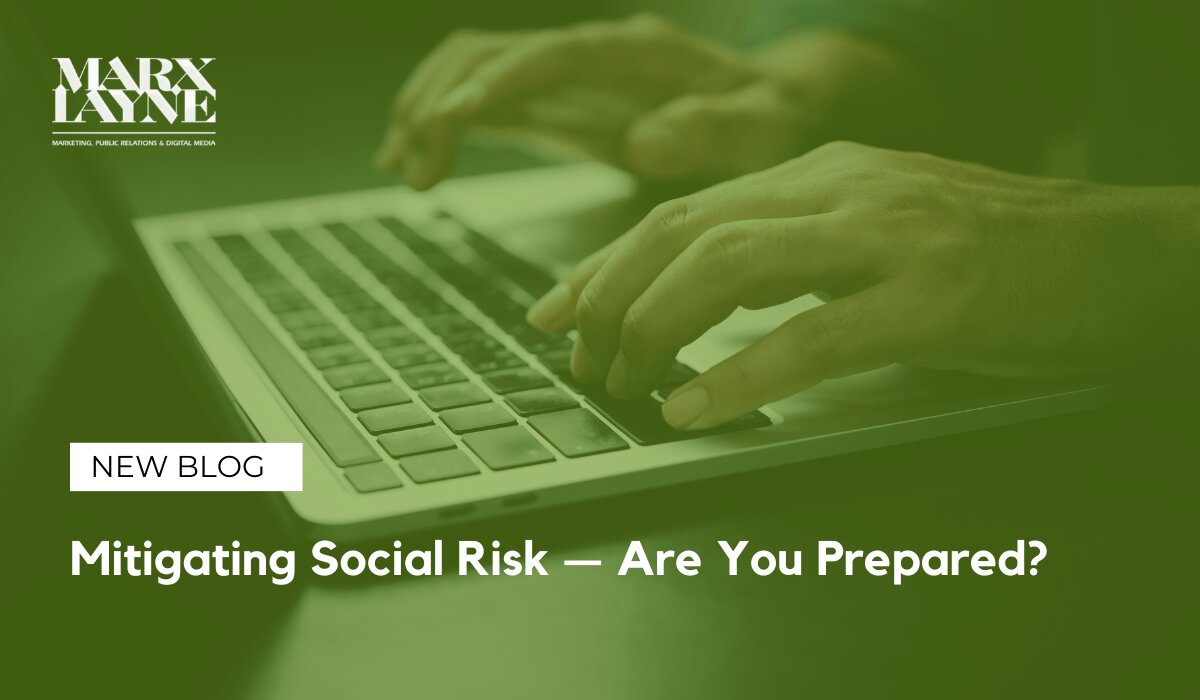
September 20, 2023
Mitigating Social Risk — Are You Prepared?
In an era defined by unprecedented connectivity and information sharing, organizations face new and complex challenges when it comes to crisis management. Traditional crisis communication strategies focused on addressing immediate operational issues (HR and [...]
In an era defined by unprecedented connectivity and information sharing, organizations face new and complex challenges when it comes to crisis management. Traditional crisis communication strategies focused on addressing immediate operational issues (HR and various legal issues, for example) are no longer sufficient. The emergence of social risk, driven by the rapid dissemination of information on social media platforms, has become the next frontier of crisis communications.
Social risk refers to the potential harm or negative consequences that can arise from an organization’s actions, decisions, or activities in relation to societal and ethical issues. It encompasses the risk of public backlash, reputational damage, and other adverse outcomes resulting from actions that are perceived as socially irresponsible, unethical, or incompatible with the values and expectations of various stakeholders, including customers, employees, investors, and the broader community. Mitigating social risk is crucial for maintaining an organization’s reputation, customer trust, and long-term success.
The Evolving Landscape of Crisis Communications
Crisis communications has come a long way since the days of carefully crafted statements and press releases. The rise of social media has given individuals the power to become instant reporters and critics, amplifying the reach and impact of crises. A single tweet, post, or video can go viral within minutes, potentially causing severe damage to an organization’s image and bottom line. Social risk encompasses a broad range of challenges, including:
1. Misinformation and Disinformation: False or misleading information can spread rapidly, leading to public confusion and mistrust
2. Public Outrage: Offended or aggrieved stakeholders can mobilize online, organizing boycotts, protests, and public shaming campaigns
3. Employee Activism: Employees can use their social media platforms to voice grievances, demand change, or expose internal issues, creating internal and external pressures
4. Ethical and Social Responsibility Concerns: Organizations are increasingly scrutinized for their actions and impact on society, including environmental practices, diversity, and labor policies.
Mitigating Social Risk
To effectively mitigate social risk in the realm of crisis communications, organizations must adopt a proactive and comprehensive approach. Here are some strategies to consider:
1. Social Media Listening and Monitoring: Invest in robust social listening tools to stay vigilant and identify potential issues before they escalate. Regularly monitor mentions, hashtags, and sentiment analysis to understand public perception.
2. Rapid Response Teams: Establish cross-functional teams equipped to respond swiftly to emerging crises. These teams should include members from public relations, legal, and social media management.
3. Transparent and Authentic Communication: In a crisis, honesty and transparency are paramount. Address issues head-on, admit mistakes if necessary, and communicate what steps the organization is taking to rectify the situation.
4. Engagement and Dialogue: Engage with stakeholders, respond to questions and concerns, and actively participate in discussions to demonstrate a commitment to resolving issues.
5. Employee Advocacy Programs: Educate and empower employees to become brand advocates on social media. Encourage them to share positive stories and respond to criticism constructively.
6. Scenario Planning and Simulations: Conduct crisis scenario planning and simulations to prepare for various social risk scenarios. This helps refine response strategies and enhances preparedness.
7. Ethical and Social Responsibility Commitments: Proactively address ethical and social responsibility concerns by aligning organizational values with tangible actions. Show a genuine commitment to social and environmental causes.
8. Crisis Communication Training: Train employees at all levels in crisis communication protocols to ensure a consistent and unified response during a crisis.
Case Study: A Client’s Response to the Groups Spreading Misinformation
One example of effective social risk mitigation is a previous client’s response to controversy surrounding the intentional spreading of misinformation online about its operations and products. At our suggestion — and, with our guidance — the company responded with a powerful digital ad campaign that addressed the situation head-on and featured a “myth vs fact” landing page on its website. This bold communication reinforced the company’s commitment to honestly and transparency and fought back with facts.
Are you prepared?
Mitigating social risk is the next frontier of crisis communications. Organizations must be prepared to respond swiftly and effectively to potential crises that can spread like wildfire online. Remember, in today’s interconnected world, a well-handled crisis can even enhance an organization’s reputation, demonstrating its commitment to ethical values and responsible business practices. The only question is: are you prepared?
Share This Story, Choose Your Platform!
Marx Layne is your competitive advantage.
Your reputation and success are our only concerns.
